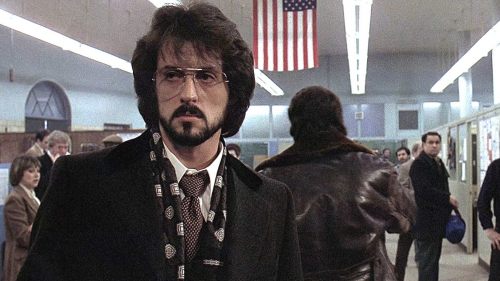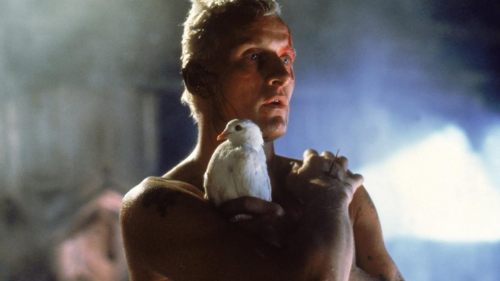Hauer vs. Howell: Don’t Pick Up THE HITCHER
“My mother told me to never do this.”
Which is the definitive Rutger Hauer performance? Most will likely offer up Roy Batty as their answer – the platinum blonde Replicant from Ridley Scott’s Blade Runner, who wants nothing more than to prolong the condensed lifespan his creator bestowed upon him. Others will possibly dig back into his work with Paul Verhoeven, where the actor brought a primal yet refined sexuality to pictures like Turkish Delight and Soldier of Orange (not to mention ‘85’s vastly underrated Flesh + Blood). Then there’s his overabundance of oddball action output during the '80s and '90s, elevating otherwise inelegant genre fare such as Blind Fury, Split/Second and Surviving the Game ever so slightly above their dusty VHS rack status. Hauer is a performer whose career is completely bizarre on paper and even more inexplicable when you actually watch some of these wacko movies. Yet every time he’s on screen, the Dutch madman gives nothing less than 100%, completely committing to whatever universe he’s decided to step into.
Certainly up for consideration is Hauer’s unhinged turn as John Ryder, the enigmatic and inescapable titular psychopath from Robert Harmon’s The Hitcher. The feature debut from prodigious horror scribe Eric Red (Near Dark), Ryder is a near elemental instrument of death, stalking Jim Halsey (C. Thomas Howell), the poor sap who picks him up during a cross country trip from Chicago to San Diego. There’s never a motive assigned to Ryder’s madness, and Hauer conveys the maniacal glee he derives from toying with his clean cut prey, not only threatening to cut out the boy’s eyeballs, but also going as far as to frame the kid for the mutilations he’s already committed. In fact, this brutal ecstasy seems to be the only driving force behind Ryder’s very existence, as he often seemingly appears out of thin air, ready to mow down any and all who cross his path, just to prove to Halsey how addictive the power of utter chaos is.
At its best, The Hitcher operates like a waking homoerotic nightmare, with Ryder becoming near psychically linked with Halsey during their arid, absurdist chase. Harmon’s horror picture is almost like a slasher repurposing of Vanishing Point, only instead of racing toward existential freedom, Halsey’s vehicle is barreling toward destructive oblivion; a blood splattered slaughter awaiting our Good Samaritan at the finish line. Where the open road was a welcoming stretch for the individual to recreate themselves in '70s road pictures like Monte Hellman’s Two-Lane Blacktop, The Hitcher presents its endless expanse of Nevada concrete as the pathway beyond safety and normality. This is the '80s, after all; a time when conformity and greed became kings, looking to knight loyal Americans who indulged in its Reagan-led excesses and crush any who went against the capitalistic grain. Ryder practically feels like a representation of the era’s collective unconsciousness, his outstretched thumb a warning as much as it is a plea to be scooped up out of a thunderstorm. “Beware, all ye who wander outside of your cities, for I am the Hell that lives beyond their borders.”
C. Thomas Howell has never been a particularly exciting actor, but his natural blandness actually works wonders in creating an avatar for corruptible America (standing right beside Jeffrey Beaumont from David Lynch’s defining masterwork, Blue Velvet). When Halsey and Ryder begin to square off, he’s nothing but a scared mouse being chased by an omnipotent hawk. The relentless persecution by Ryder (not to mention the highway patrol, who become convinced he’s committing Ryder’s crimes) drives Jim to make a choice. He either needs to opt out of this seemingly infinite pursuit (which he considers in the form of suicide), or meet the enemy head on, stooping to the same level of despicable evil as his nemesis. However, this transformation is only achievable after Halsey witnesses an act of intimate cruelty – namely the vehicular bisection of Nash (Jennifer Jason Leigh), a diner waitress who befriends the boy and tries to help him evade both the cops and Ryder’s imminent wrath. Nash’s demise is one of the most chilling moments of pure hopelessness in '80s genre film, and Howell’s reaction to it is agonizing. We can literally see a loss of humanity standing in for Halsey’s lack of personality, the lurid transformation as absolute as any of the body horror David Cronenberg offered up during the same period.
Regardless of how well Howell is cast, The Hitcher is primarily a showcase for Hauer to channel taciturn, unfeeling malevolence. Much like Jason Voorhees, his John Ryder is a campfire story come to life, destroying all who Halsey briefly befriends. “I want to die,” Ryder hisses at the boy, knowing that the completion of this act by Halsey’s hand will unify the two in damnation. As per usual, Hauer effortlessly slides into the skin of this tantalizing devil and locks onto his opponent with crystal blue eyes, daring Howell to meet him on the same level of performance. This is perhaps why The Hitcher may be the very best role in the actor’s fascinating filmography. It is a demonstrable representation of just how great a performer he is, lifting what could’ve been nothing more than exploitive trash up on his shoulders, in turn producing a horror semi-classic.



